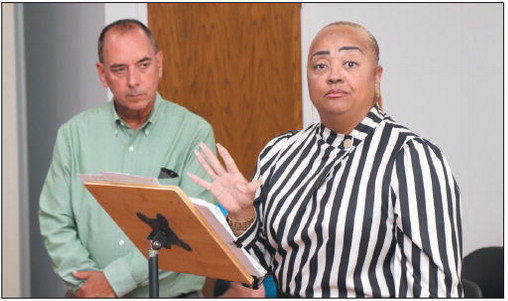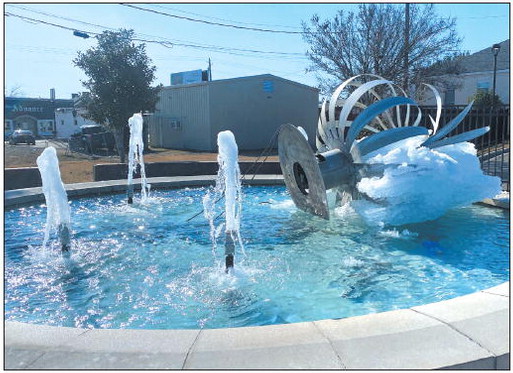MoCo Commissioners Deny Mobile Home Decal Elimination


Tensions were high at the regular monthly meeting of the Montgomery County Board of Commissioners meeting on Monday, September 9, as the commissioners denied Tax Commissioner Renee Wooten-Perry’s request to eliminate the issuance of mobile home decals continued from page
for the third time. “First, I just want to say that I’m disappointed. This is my third time being up here with these decals. I think my next move – I want to let you know – that I will formally request to the Department of Revenue the potential of misconduct involving the Montgomery County Board of Commissioners, specifically concerning their refusal to pass a resolution related to mobile home decal enforcement – an action I believe is rooted in personal and political retaliation,” Perry told the commissioners. “Under OCGA 48-5-192, my office is responsible for issuing mobile home location permits and when applicable, ensuring the compliance through the use of decals if such is required by the county governing authority, which are you but you don’t have anybody to enforce it because we don’t have a code enforcement [officer]. A proposed resolution affirming the enforcement of this program was recently brought before you guys not one time, not two times, but three times. Despite its administrative importance and legal grounding, the Board refused to adopt the resolution.”
She continued, “I have strong reason to believe this refusal was not based on policy or procedural issues but rather stems from personal relationships between the former chairman Leland Adams and the Vice Chairman Clarence Adams of the Board and my recent election opponent who was not successfully at her campaign. This refusal obstructs my ability to perform my statutory duties and jeopardizes uniform enforcement of mobile home regulation laws in Montgomery County.”
“And my concern I raise here is abuse or oppression of public officials based on personal or political bias, obstruction of lawful duties carried out by a constitutional officer, erosion of public choice and interference with legal mandated tax enforcement [mechanism]. So, I’m requesting in a letter to the Board of Department of Revenue about this, whether the Board refused or constituted an abuse of authority or unethical retaliation,” she concluded.
The elimination of the practice of issuing mobile home decals was first proposed in August, as Perry sent a request for a resolution to be passed to allow this elimination. Montgomery County Tax/Tag Specialist Victoria Strange attended the Commissioners’ August work session to discuss the matter.
Strange explained to the Commissioners that the mobile home decal issuance process cost the County to both buy the decals and mail out the required letters. She stated that the process also was very time-consuming for the employees.
In the August meeting, Tax Commissioner Perry addressed the resolution, but commissioners denied the request, as they had concerns about how mobile homes could be tracked and efficiently taxed without the mobile home decals.
During the September monthly work session on Thursday, September 4, Tax Commissioner Perry spoke to the county commissioners again about eliminating the practice, as she shared digital methods had been developed to help replace the process.
“I’m here again to respectfully ask that you consider to eliminate the requirement for mobile home decals in our county. I fully understand your concern about revenue and the need to track mobile homes for taxation and regulation, and I too agree that these are important. However, decals are an outdated system. They come with administrative costs for printing, distribution, and enforcement. And they don’t reliably ensure compliance. Some decals go uncollected, and many are never displayed, making enforcement ineffective,” she explained. “Instead, we can rely on the system that we already use, like the property tax rule, GIS method, and mobile home park registries to track mobile homes more reliably and cost efficiently. These systems offer stronger data, better compliance, and fewer opportunities for human error or manipulation.”
Perry said that many counties within the state had eliminated the issuance of mobile home decals after state law was changed to allow counties to decide whether or not to continue the practice. Some counties that have already eliminated the decals are Treutlen, Toombs, Jeff Davis, Bacon, Dodge, and Hall Counties; Emanuel and Wheeler Counties are currently in the process of getting rid of the decal system.
“I’m asking you to vote to modernize our approach. Let’s eliminate the decal requirement, and work together for a more efficient, digital, and revenue neutral solution,” Perry emphasized.
She told the commissioners that she understood their concerns about this change, and had spoken with Commissioner Amie Vassey about the effects that eliminating the decals would have on the county. According to Perry, there are around 1,400 mobile homes affixed to a property in Montgomery County, while 352 mobile homes are not affixed to a property. Of these 352 mobile homes, only 88 homeowners had not paid their property taxes – a number that had decreased since August 1, when 92 mobile homeowners had not paid taxes.
“The concern is not about the money because those 88 people got an intent notice,” she clarified. “I just want to make it a little bit less work on us to get these decals done away with.”
Perry continued, “The change is intended to simplify the process for mobile home owners and save us almost $1,000 annually on decal production and postal costs. Even without the decals, property taxes on mobile homes are still due annually on April 1, and late payments will incur penalties.”
Commission Chairwoman Ginger Morris thanked Perry for coming, as she said, “I think part of the confusion was when you send it in, we don’t know, and when we don’t know, of course, we’re going to stick with what we do know.”
Morris asked Perry about what programs are in place digitally to replace the decal system, and Perry informed her about GIS, which maps the county digitally, and the mobile home permit process. “We have traces and accountability for each mobile home. As far as mobile home parks, they have registries. There are three different more ways to track them or not track them,” Perry said.
Morris also asked if the County could reinstate the usage of the mobile home decals if they discovered that the County was not receiving the same amount of revenue without the decals; Perry said that the Commission did have that power.
Commissioner Vassey shared that she had spoken with the Montgomery County Tax Assessors Office and the county’s IT contractor on the issue.
“Our main concern was that if we do away with decals, we are not replacing it with any viable and durable tracking method, but what I was able to uncover was that we actually are. There is another electronic tracking method specifically that takes its place. There’s a system called WINGAP, but the tax assessor’s office stated that when someone brings a mobile home into the county, they go into their office and fill out the permit application,” Vassey explained.
She stated that these applications were immediately put into WINGAP “It’s immediately digitally visible. Essentially, it’s like a decal would be looking out. So, when the tax appraiser goes out, she can get on her laptop and get on WINGAP and verify. So, when she pulls up, she doesn’t have to go sneaking in someone’s yard to try to see a sticker on a window – she can actually sit at the road and just pull it up on WINGAP and verify if they have it or not,” she continued.
Vassey added, “It’s actually much safer, it’s quicker, it’s more resident friendly because they’re not having to stick those stickers on their window. So, I actually – once I connected with those departments and have a better understanding of it – I actually no longer have any concerns about doing away with the decals, in fact, I think it makes sense. There is a small cost savings, but it is a cost savings, and it eliminates some busy work – some unnecessary work. I don’t have a problem with it now that I have a better understanding of the system.”
She clarified that the county tax appraiser would have to request that WINGAP be installed on her devices by the IT contractors, but that the installation was quick and simple. She emphasized that the decal system had been created prior to the advancements in internet and technology of today’s society, and was antiquated in practice.
Montgomery County Tax/Tag Specialist K.C. Seabury also addressed the commissioners, saying, “On the other side of that same coin, when you look at the enforcement side of the value of these decals, there’s no one enforcing or going out and looking for those decals to say, ‘Got you! We have a trailer without decals.’ We’re hearing from taxpayers – in my short time being there – that people get their decals, they put them in a folder, and they put them in a drawer in their laundry room or kitchen. They’re no longer sticking them in the windows because nobody’s out looking for them anyways. It’s a fruitless effort.” He continued, “Fines and penalties that have been accessed because of citations, if you’re not sure if we’re losing money or not, we’re not aware of any fines or any citations having been issued because someone didn’t have their decal in the window because it’s not being enforced.”
Commission Chairman Morris reiterated that the commissioners had been concerned that individuals would be able to sneak mobile homes into the county without informing the tax officials, and asked who the tax appraiser would report her findings to if she discovered an unregistered mobile home. Tax Commissioner Perry clarified that that would fall under the duties of the tax assessor, and that there was a process for handling those sorts of issues.
Commissioner Leland Adams asked about ways in which tracking was improved digitally, and Tax Commissioner Perry explained that technology to better handle the issue had not been discovered. He explained that his concern for the action centered around the current reappraisal occurring in the county.
“Hopefully, the Board of Assessors is in the process of reassessing everything and will determine what’s out there. I would feel better to wait until after they complete their assignment before we bring this back up and take it for another vote. If they find everything that’s out there and document it, then yeah, I might feel better about getting rid of the decals,” he told Perry.
She asked Adams if he knew of any undocumented mobile homes and he stated he had not searched the county for them. The pair discussed the process of handling these undocumented properties.
Commissioner Vassey shared her experience working as an auditor for a private company, and stated that searching for decals or other things on properties could be complicated and difficult.
At the meeting on Monday, September 9, Commissioner Vassey made a motion to pass a resolution requiring the mobile home decals not to be required. The motion failed because of a lack of a second.
During the public comments section of the meeting, Seabury rose and spoke to commissioners again regarding the issue, as he stated, “I would like to say that I think the commissioners should be ashamed of themselves for being willing to vote down the purchasing of decals for trailers or mobile homes without doing the research. The research says to quit spending the money to buy them. Apparently, the homework has not been done. That’s a sad commentary on the commissioners.”





